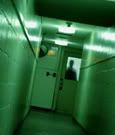At least, I think a layman wouldn't have much trouble - I'm not one, heh.
I ain't no yoonivarsity type, but I couldn't agree more about Bordwell's ability to get across the structuring of a scene. Many authors have tried to put the craft into prose, but I've yet to find one amongst the circle of HK-cinema related authors who can streamline the deconstruction of a scene in such an easy-to-grasp way.
And Bordwell's not necessarily dealing with easy or famous sequences in this book either, as he smokes out the little cutting rhythms and frame compositions of even the most seemingly mundane segments of some movies. Many of the non-Hong Kong directors (American, European, Australian, even other Asian) who've tried to emulate the "style" of Hong Kong action cinema without understanding the altogether unique mechanics of construction really,
really need to stop posing and read Bordwell's book. And even then, I doubt many of them, schooled in a more westernized style of scene construction, could deviate from what they know to even attempt to build a sequence the way they did (and sometimes still do) in Hong Kong.
BTW, Brian, I'd be interested in a commentary from Bordwell too. Ideally, Bordwell or Teo paired with someone with insider knowledge (like a director) though this is clearly often not possible. Bordwell, by his own admission, isn't particularly "in" the Hong Kong cinema scenes - he could break down the films and compare them, etc, but one of my favorite things on commentary tracks are stories from production, why things were done a certain way, etc. Which is one reason why the John Woo and Tsui Hark commentaries are so good.
Your mention of his not being "in" the Hong Kong scene is
precisely why I would damned near
pay the man to do a commentary. Teo as well. In lieu of director's who seem disinterested in revisiting old works, some of these scholars would be ideal. Outside of directors and (maybe) producers, both of whom oversee enough of their productions to be reasonably authoritative on a commentrary track, being involved with a film "scene" too often results in little more than name-dropping and location-spotting on audio commentaries, and not just by the self-anointed "expert(s)" who get the plum commentary gigs for Asian films right now. Think of some actor commentaries on DVDs. There are some good ones, I'll admit, but most of 'em are about as enjoyable as pissing razor blades. Many actors, too many in fact, are "scenesters" who can't really bring much depth to the tracks they record because, quite frankly, they often don't seem to "get" the movies they star in. Of course, my bias is that I'm a bit of a junkie for commentaries, especially on older titles for which there has been some time, preferably years or decades, between the production of the film and the recording of the commentary. I listen to the tracks on virtually every disc I buy that has one while I'm plugging away at the office. The movie's already in my head, so no need to freak out the bosses by watching movies on company time!

The commentary on Master of the Flying Guillotine....springs to mind.
I seem to recall those guys re-recorded a track for the special edition re-release of that film, so perhaps they corrected their errors (I remember one of them owning up to the boo-boos online, which was cool). Unfortunately, I also recall that the special edition re-issue was a much crummier transfer, which made it unworthy of an upgrade!

I am curious if HK director's are even approached to do commentaries? I wouldn't care if they were in Cantonese with subtitles, it would still be very interesting. Of course, in all likelihood, a Cantonese commentary track wouldn't get subtitles... I have a couple Japanese films that have Japanese commentary without translation, which is sad, but understandable.
I doubt HK director's get asked very often, especially by British and American distribs who would find it much easier to keep throwing gigs at the same guy, but even if they were, I wonder how many of them would give it a shot.

Gotta give credit to Tartan USA, though, and their line of Korean horror DVDs. Where possible, they almost always port over the Korean commentary tracks and add subtitles. Unfortunately, they also seem to release
every Korean horror movie that comes along, and their catalogue is plagued with a lot of mediocre films. But still, their efforts with the commentaries are commendable.
I suppose when it comes to the more disposable nature of Hong Kong cinema—even amongst its makers—the likelihood of commentaries will continue to be rare (and treasured!). Who knows, maybe HK industry folks just don't have the time! Or maybe, keeping with the theme of disposability, they don't consider a lot of their own films as particularly worth disecting after the fact...????


